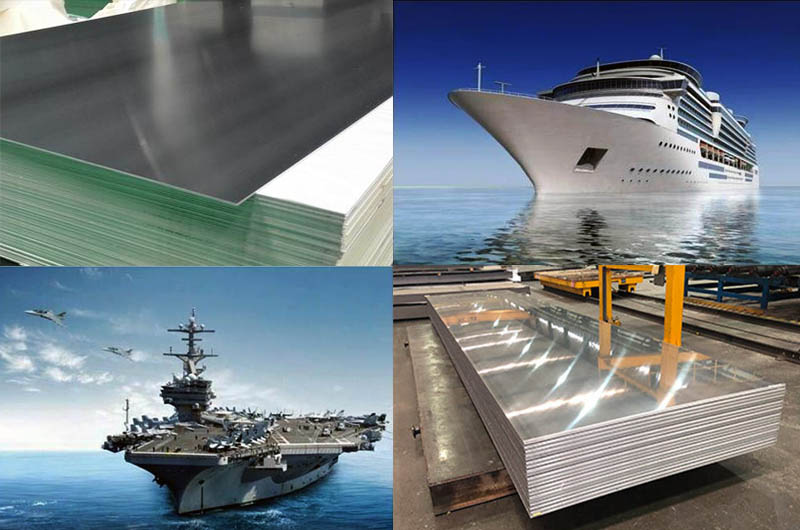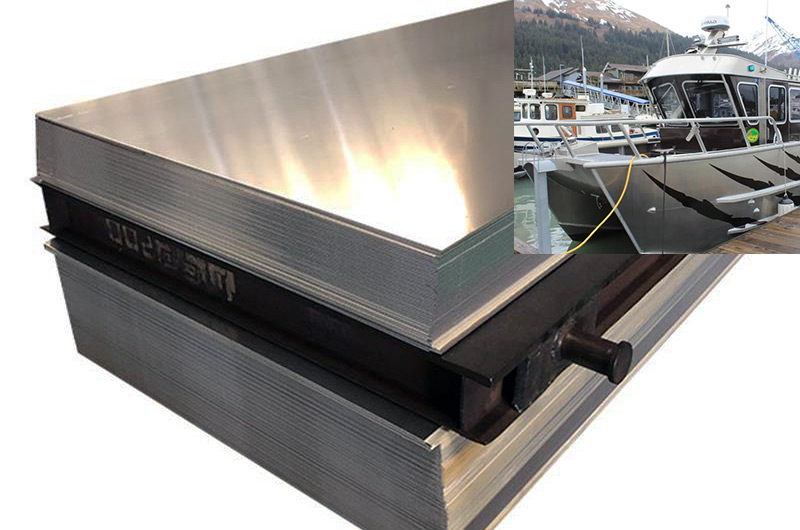- Properties of Ship Aluminum
- Advantages of Ship Aluminum
- Applications of Ship Aluminum
- People also ask about Ship Aluminium
- People also ask about Ship Aluminium
- Challenges and Considerations
- Conclusion
The use of aluminum in shipbuilding has significantly evolved over the years, transforming the maritime industry by offering a lightweight yet robust alternative to traditional materials.
Aluminum, a versatile metal, has gained prominence in various industries, and its unique properties make it an ideal choice for constructing different components of modern ships.

Properties of Ship Aluminum
Aluminum possesses several key properties that make it an excellent material for shipbuilding:
1. Lightweight: One of the most significant advantages of aluminum is its low density, making it much lighter than steel. This characteristic is crucial in the maritime industry, where reducing weight is paramount for fuel efficiency and overall vessel performance.
2. Corrosion Resistance: Aluminum naturally forms a thin oxide layer on its surface, providing excellent corrosion resistance. This property is particularly advantageous in a marine environment where ships are constantly exposed to saltwater and other corrosive elements.
3. High Strength-to-Weight Ratio: Although aluminum is lightweight, it exhibits impressive strength. This high strength-to-weight ratio allows shipbuilders to design vessels with increased payload capacity without compromising structural integrity.
4. Malleability and Formability: Aluminum is highly malleable and can be easily formed into various shapes, facilitating intricate designs in ship construction. This flexibility allows for innovative and streamlined ship designs, improving hydrodynamics and efficiency.
5. Thermal Conductivity: Aluminum's high thermal conductivity aids in the even distribution of heat. This property is particularly advantageous in shipbuilding, where efficient heat dissipation is essential for various systems and components.
Advantages of Ship Aluminum
1. Fuel Efficiency: The lightweight nature of aluminum contributes to improved fuel efficiency by reducing the overall weight of the ship. This is a critical factor for both commercial and naval vessels, where fuel costs and operational range are significant considerations.
2. Reduced Maintenance Costs: The corrosion resistance of aluminum reduces maintenance requirements, leading to lower overall operational costs. Ships constructed with aluminum components generally experience less wear and tear due to corrosion, prolonging their lifespan.
3. Environmental Impact: Aluminum is a recyclable material, aligning with the increasing emphasis on sustainability in the maritime industry. Recycling aluminum requires significantly less energy compared to producing it from raw materials, making it an environmentally friendly choice.
4. Speed and Agility: The combination of lightweight construction and high strength allows aluminum ships to achieve higher speeds and better maneuverability. This is particularly important in military applications, where agility and speed are strategic advantages.
5. Customization and Innovation: Aluminum's formability enables the construction of unique and innovative ship designs. Shipbuilders can experiment with novel shapes, contributing to the ongoing evolution of naval architecture and hydrodynamics.
Applications of Ship Aluminum
Various aluminum alloys are used in shipbuilding, each chosen for its specific properties that align with the demands of different ship components. The selection of the appropriate alloy depends on factors such as strength, corrosion resistance, weldability, and cost.
5083 Aluminum Plate for Hulls and Superstructures
Hulls and Superstructures: Aluminum is commonly used in the construction of ship hulls and superstructures. Its lightweight nature allows for the creation of larger vessels without sacrificing stability.
Alloy 5083: This alloy is known for its exceptional strength and corrosion resistance, particularly in marine environments. It is widely used for constructing ship hulls and superstructures due to its high seawater corrosion resistance and good weldability.

5456 Aluminum Plate for Decks and Bulkheads
Decks and Bulkheads: Aluminum decks and bulkheads contribute to the overall weight reduction of the ship. Additionally, the corrosion-resistant properties of aluminum enhance the durability of these components.
Alloy 5456: This alloy is commonly used for decks and bulkheads. It offers good corrosion resistance and excellent weldability. Its strength and toughness make it suitable for applications where structural integrity is crucial.
6061 Aluminum Plate for Masts and Rigging
Masts and Rigging: In sailing vessels, aluminum is often employed in the construction of masts and rigging. The material's strength is crucial for supporting sails and handling various loads.
Alloy 6061: This alloy is known for its high strength and good corrosion resistance. It is often used in the construction of masts and rigging components in sailing vessels. Alloy 6061 is also known for its good formability, making it suitable for complex shapes.
6061 Aluminum Plate for Marine Equipment
Marine Equipment: Aluminum is widely used in the fabrication of marine equipment, such as radar masts, davits, and gangways. Its corrosion resistance ensures the longevity of these components in the harsh marine environment.
Alloy 6061: Similar to its use in masts and rigging, Alloy 6061 is often employed in the fabrication of marine equipment such as radar masts, davits, and gangways. Its versatility and strength make it a popular choice for various applications.
3003 Aluminum Plate for Interior Components
Interior Components: Aluminum's aesthetic appeal, combined with its lightweight and corrosion-resistant properties, makes it a popular choice for interior components such as furniture, cabinetry, and fittings.
Alloy 3003: This alloy is favored for interior components due to its excellent formability, corrosion resistance, and moderate strength. It is often used in furniture, cabinetry, and fittings where aesthetics and ease of fabrication are essential.
While these alloys are commonly used in shipbuilding, it's important to note that advancements in alloy development and manufacturing processes may introduce new alloys or variations tailored to specific shipbuilding requirements.
Additionally, the choice of alloy can be influenced by factors such as regional availability, cost considerations, and specific design requirements for a particular vessel.
People also ask about Ship Aluminium
- ship aluminium alloy
- ship aluminium
- aluminium shipbuilding
- aluminium shipbuilders
- aluminium ship ladder
- aluminium hull ship
- aluminium ship construction
- aluminium shop fabrication
- aluminum landing craft
- aluminium ship
- aluminium patrol boat
- aluminum boat landing craft
- landing craft aluminum boats
- small aluminum landing craft
People also ask about Ship Aluminium
What type of aluminium is used in ship building?
Can a ship be made from aluminum?
What is the use of aluminum in ships?
Challenges and Considerations
While ship aluminum offers numerous advantages, there are also challenges and considerations to be aware of:
1. Cost: Initially, the cost of aluminum can be higher than traditional materials like steel. However, the long-term benefits, including reduced maintenance and fuel costs, often outweigh the initial investment.
2. Welding Complexity: Aluminum welding requires specialized techniques due to its lower melting point compared to steel. Skilled welders and advanced welding technologies are essential for ensuring the structural integrity of aluminum ship components.
3. Galvanic Corrosion: When aluminum comes into contact with certain metals in a marine environment, galvanic corrosion can occur. Proper engineering and material selection are necessary to mitigate this potential issue.
4. Material Compatibility: Aluminum may not be suitable for all ship components, and careful consideration is required to determine the most appropriate materials for specific applications.
Conclusion
Ship aluminum represents a remarkable advancement in marine engineering, revolutionizing the way vessels are designed and constructed. Its combination of lightweight properties, corrosion resistance, and high strength has led to more efficient, environmentally friendly, and innovative ships.
As technology continues to advance, and environmental considerations become increasingly important, the role of ship aluminum is likely to grow, shaping the future of maritime transportation and naval operations.
